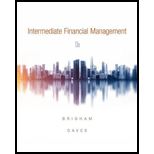
Concept explainers
Case summary:
Chief financing officer of Company RR, a speciality coffee manufacturer, is re-thinking about its working capital policy and wants to re-new its line of credit and it wouldn’t ready to build payroll, probably forcing the company out of business.
The scare has forced the company to examine carefully about each component of working capital to make sure it is required, and decide whether the goal is to determine the line of credit are often eliminated entirely.
Previously, it has done little to look at assets and mainly because of poor communication among business functions and the decisions about working capital cannot be made at vacuum.
To discuss: Reason of having a positive target cash balance by company, if cash doesn’t earn interest.
Want to see the full answer?
Check out a sample textbook solution
Chapter 21 Solutions
Intermediate Financial Management (MindTap Course List)
- Do not answer wit incorrect values i will unhelpful!arrow_forwardWhat are the implications of missing a credit card payment in finance?arrow_forwardOmni Advisors, an international pension fund manager, uses the concepts of purchasing power parity (PPP) and the International Fisher Effect (IFE) to forecast spot exchange rates. Omni gathers the financial information as follows: Base price level 100 Current U.S. price level 105 Current South African price level 111 Base rand spot exchange rate $ 0.188 Current rand spot exchange rate $ 0.171 Expected annual U.S. inflation 7% Expected annual South African inflation 5% Expected U.S. one-year interest rate 10% Expected South African one-year interest rate 8% Required: a. The current ZAR spot rate in USD that would have been forecast by PPP.Note: Do not round intermediate calculations. Round your answer to 4 decimal places. b. Using the IFE, the expected ZAR spot rate in USD one year from now.Note: Do not round intermediate calculations. Round your answer to 4 decimal places. c. Using PPP, the expected ZAR spot rate in USD four years from now.Note: Do not round intermediate calculations.…arrow_forward
- Delta Company, a U.S. MNC, is contemplating making a foreign capital expenditure in South Africa. The initial cost of the project is ZAR11,000. The annual cash flows over the five-year economic life of the project in ZAR are estimated to be 3,300, 4,300, 5,290, 6,280, and 7,250. The parent firm's cost of capital in dollars is 9,5 percent. Long-run inflation is forecasted to be 3 percent per annum in the United States and 7 percent in South Africa. The current spot foreign exchange rate is ZAR per USD = 3.75. Required:. Calculating the NPV in ZAR using the ZAR equivalent cost of capital according to the Fisher effect and then converting to USD at the current spot rate. - NPV in USD using fisher effect Converting all cash flows from ZAR to USD at purchasing power parity forecasted exchange rates and then calculating the NPV at the dollar cost of capital. - NPV in USD using PPP rates Are the two USD NPs different or the same? What is the NPV in dollars if the actual pattern of ZAR per…arrow_forwardWhat is the 50/30/20 budgeting rule in finance?arrow_forwardHow do student loans impact long-term financial health?arrow_forward
- With regard to foreign currency translation methods used by foreign MNCs, Multiple Choice a. foreign currency translation methods are generally only used by U.S. based MNCs since foreign firms have a built-in hedge by being foreign. b. are generally the same methods used by U.S.-based firms. c. are exactly the same methods used by U.S.-based firms since GAAP is GAAP. d. none of the options.arrow_forwardCray Research sold a supercomputer to the Max Planck Institute in Germany on credit and invoiced €11.60 million payable in six months. Currently, the six-month forward exchange rate is $1.18 per euro and the foreign exchange adviser for Cray Research predicts that the spot rate is likely to be $113 per euro in six months.Required: a. What is the expected gain/loss from a forward hedge?Note: A Negative value should be indicated with a minus sign. Do not round intermediate calculations. Round your final answer in whole dollars not in millions.arrow_forwardWhat is the time value of money and how is it calculated? need answer!arrow_forward
 Intermediate Financial Management (MindTap Course...FinanceISBN:9781337395083Author:Eugene F. Brigham, Phillip R. DavesPublisher:Cengage LearningPrinciples of Accounting Volume 2AccountingISBN:9781947172609Author:OpenStaxPublisher:OpenStax College
Intermediate Financial Management (MindTap Course...FinanceISBN:9781337395083Author:Eugene F. Brigham, Phillip R. DavesPublisher:Cengage LearningPrinciples of Accounting Volume 2AccountingISBN:9781947172609Author:OpenStaxPublisher:OpenStax College Auditing: A Risk Based-Approach (MindTap Course L...AccountingISBN:9781337619455Author:Karla M Johnstone, Audrey A. Gramling, Larry E. RittenbergPublisher:Cengage LearningPrinciples of Accounting Volume 1AccountingISBN:9781947172685Author:OpenStaxPublisher:OpenStax College
Auditing: A Risk Based-Approach (MindTap Course L...AccountingISBN:9781337619455Author:Karla M Johnstone, Audrey A. Gramling, Larry E. RittenbergPublisher:Cengage LearningPrinciples of Accounting Volume 1AccountingISBN:9781947172685Author:OpenStaxPublisher:OpenStax College




